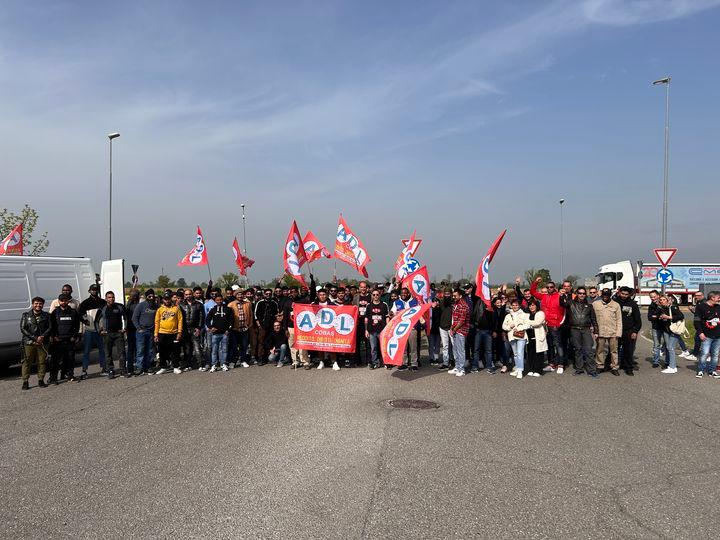
March of discontent: lessons in work struggles

Previous editorial by Infoaut.org
Translation by ItalyCalling (@ItalyCalling)
Logistics workers strike
Block the goods, generalise the struggle, united we win!
The working class is awakening, and the mobilisations of the last few days among the logistics sector workers in Emilia Romagna are the first signs. Recently, we have seen two different images of work struggles: the Peugeot workers in Paris clashing with the police on one hand; and the sad, resigned-looking picket organised by Fiom outside a Fiat establishment in Italy, on the other hand. Both are fighting for their jobs, but the differences are clearly visible and stimulate many diverse reflections. The French workers’ determination in defense of their rights and dignity has spread to the Italian logistics sector workers’ mobilisation on March 22, and manifested in their determination to defeat the enemy. Workers of different backgrounds and origins, Italians and migrants, have united against the exploitation carried on by the worker cooperative owners and the main worker cooperative, the Coop.
Since the 80s we’ve heard constant complaints about the decrease of work struggles, the defeat of trade unions, the birth of negotiations and of a new trade unionism that imposes its rules on the working class hand in hand with the bosses. Yet, the disappearance of work struggles, at least in terms of quantity, isn’t only the result of a new culture of resignation infecting the working classes. It is also the result of a deliberate decision made by the confederate trade unions: to abandon single struggles without attempting a unifying strategy that would impose a viewpoint different from the one the bosses have imposed on the working classes.
The logistics workers’ mobilisations represent an important watershed that has made the word “strike” meaningful again – as it was at the dawn of the working class movement, when a strike was an actual weapon to injure the enemy. The March 22 strike has vindicated rights and dignity so far denied – as human beings first of all, and only secondly as workers. “Dignity” was the word most commonly heard at the four pickets outside the workplaces’ gates. The same dignity has allowed the workers to bring an entire country to a halt – a country used to the comfort and “beauty” of its shopping malls. From March 22 we should all ask ourselves how that beauty has been created, by whom, and in what conditions. The “theatre of wealth and opulence” is carried on the shoulders of the distribution workers employed in conditions of semi-slavery, and through the destruction of the private lives of the workers forced to work on public holidays. What we’re saying is there are workers who are exploited like slaves to guarantee a good image and profit for the bosses. It’s this demand for dignity that has made the workers unmovable, even in the face of threats from the police.
We need to start again from here: we need for these struggles not to remain isolated, but to spread to other industries. The confederate trade unions strategy doesn’t work anymore, and where it still does, it hasn’t got much time left. We are referring to the idea of utilising strikes and other forms of struggles in a bid for negotiations that in reality only manage to postpone layoffs for a few months or a couple of years maximum, gaining slight concessions in the way workers are disposed of. This approach is just a temporary protection inevitably destined to defeat. We know the logistics workers’ struggle is scaring people and the silence of the media shows it: despite weeks of campaigning, the only mention of it in the media was a report of the clashes that took place on Via Emilia and of a worker being run over by a truck driver who wanted to break a blockade. Nothing new here: the search for sensationalist news is the fundamental characteristic of an ever more disappointing and ever more widespread way of doing journalism.
The traditional trade unionism’s strategy was made explicit at the blockade outside the Interporto, where the CGIL attemped to force the blockade to allow its members to scab the strike. Thus, the Interporto strike was a crossroads, where everyone finally made it clear which side of the barricade they were on – workers and their demands on one side, bosses and vested interests on the other. March 22 has certainly been a watershed, at least for the region of Emilia Romagna. In the feedback collected in companies around Modena people talk of those times when the pickets were organised by the same trade unions that now hide themselves pretending not to see, and even trying to break up, the pickets. These trade unions haven’t called for a strike worthy of the name for too long, and their top personnel even dare get offended when they are accused of acting as “firefighters” for the bosses!
In conclusion, the March 22 strike has taught us some important lessons. Those who were wondering if the working class is still able to organise effective struggles now have some answers. Of course it will be essential to monitor how widely and deeply this struggle will manage to spread and take root; and in what measure it will be a successful model, able to spread to other industries. One of its significant elements was the ability of the autonomous trade union S.I. Cobas workers to connect with other social elements, who sided with them in mobilisations, strikes and in the face of the police batons. Thanks to their openness, the logistics workers have managed to achieve an agreement with other sectors of precarious workers, which has contributed to the success of March 22. These last few days of struggle demand new reflections to be made on the division between capital and work. It will be fundamental to consider in our analysis new elements we can’t overlook anymore, seeing as we’re in the face of events that are far from being isolated nor limited to a single industry.
[Another interesting analysis can be found here.]
Ti è piaciuto questo articolo? Infoaut è un network indipendente che si basa sul lavoro volontario e militante di molte persone. Puoi darci una mano diffondendo i nostri articoli, approfondimenti e reportage ad un pubblico il più vasto possibile e supportarci iscrivendoti al nostro canale telegram, o seguendo le nostre pagine social di facebook, instagram e youtube.




















